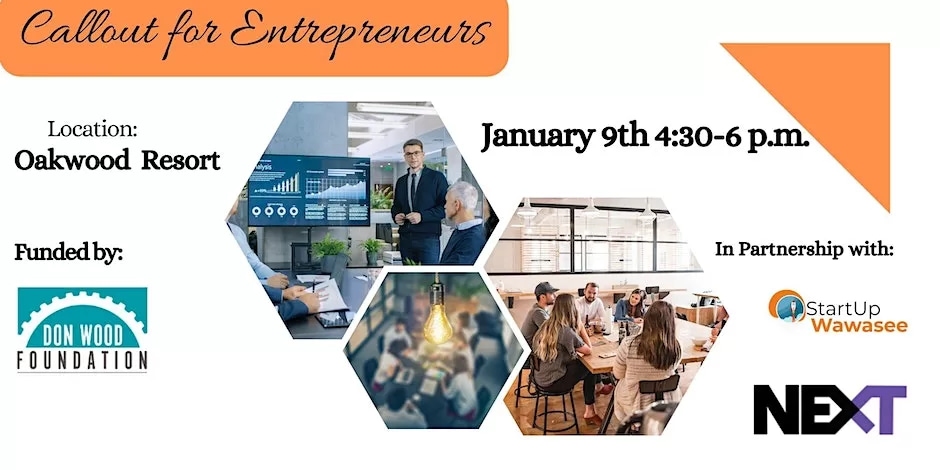FOSTERING INNOVATION & ENTREPRENEURSHIP
StartUp Wawasee
Connecting Innovators and Entrepreneurs to a unique ecosystem that is rooted in the topophilia of our lakes communities.
FROM THE FOUNDERS
-STARTUP WAWASEE-
StartUp Wawasee was heavily influenced by the books Startup Communities, The Startup Community Way, and The Coming Jobs War among others. We believe in the #givefirst mindset and subscribe to “The Boulder Thesis”. We look forward to having you as a part of the community.
Next Meetup
January 9, 2024 | 4:30pm - 6:00pm
at Oakwood Resort
Come and join us for the next StartUp Wawasee event. You'll have an opportunity to network with other entrepreneurs and business owners prior to and after the featured presenter.
What is a StartUp Community?
A startup community refers to a group of people, organizations, and resources that are focused on supporting and growing startup communities. These communities are typically centered around a geographical location or a particular industry and provide entrepreneurs with access to mentorship, networking opportunities, funding, and other resources that can help them launch and scale their businesses.
Startup communities can include a variety of stakeholders, such as entrepreneurs, investors, government agencies, incubators and accelerators, universities and research institutions, and service providers like lawyers and accountants. By fostering collaboration and knowledge-sharing among these groups, startup communities aim to create an ecosystem that supports innovation and entrepreneurship.
Who Are The Players:
There are many different players in a startup community, each with their own role to play in supporting and growing startups. Here are some of the most common players you might find in a typical startup community:
Entrepreneurs:
These are the individuals who start and run new businesses. They are the driving force behind startup communities, and they rely on the other players in the ecosystem for support and resources.
Investors:
These are the individuals or organizations that provide funding to startups in exchange for equity. They can include angel investors, venture capitalists, and corporate investors.
Incubators and Accelerators:
These are organizations that provide resources and support to startups in their early stages. They may offer office space, mentorship, networking opportunities, and access to funding.
Government Agencies:
These organizations may offer grants or other forms of funding to support innovation and entrepreneurship. They may also provide regulatory support or other resources to help startups navigate the legal landscape.
Universities and Research Institutions:
These organizations may offer access to research and development resources, as well as educational opportunities for entrepreneurs.
Service Providers:
These are professionals such as lawyers, accountants, and consultants who offer specialized services to startups. They can help with legal compliance, accounting, marketing, and other aspects of running a business.
Local Communities:
These are the people and organizations that make up the wider community around the startup ecosystem. They may provide support in the form of mentorship, networking opportunities, or other resources.

What are the rules of the community?
There are no hard and fast rules for a startup community, as they can vary widely depending on the location, industry, and culture of the community in question. However, there are some general principles that many successful startup communities tend to follow:
Collaboration and Knowledge-Sharing:
One of the key principles of a startup community is collaboration and knowledge-sharing. Members of the community should be willing to share their expertise, experiences, and resources with others in order to help everyone succeed.
Openness and Inclusivity:
Startup communities should be open and inclusive to all who wish to participate. They should welcome diversity in terms of backgrounds, experiences, and perspectives, and strive to create a safe and supportive environment for all members.
Entrepreneurial Spirit:
A startup community should be characterized by an entrepreneurial spirit and a willingness to take risks. Members of the community should be encouraged to think outside the box, try new things, and pursue innovative ideas.
Focus on Outcomes:
Successful startup communities should have a focus on outcomes rather than outputs. They should be focused on creating tangible value for their members, such as increased revenue, job creation, or social impact.
Support for Startups at All Stages:
A good startup community should provide support for startups at all stages of development, from ideation to scaling. This could include mentorship, funding, access to resources, or other forms of support.
Connectedness:
A startup community should be connected to other communities and networks, both locally and globally. This can help to create a broader ecosystem of support for startups and provide access to new markets and opportunities.
Long-Term Focus:
Finally, a successful startup community should have a long-term focus. Building a thriving startup ecosystem takes time and effort, and the community should be committed to investing in its members and supporting their growth over the long term.
© 2025 South Shore Ventures, LLC





